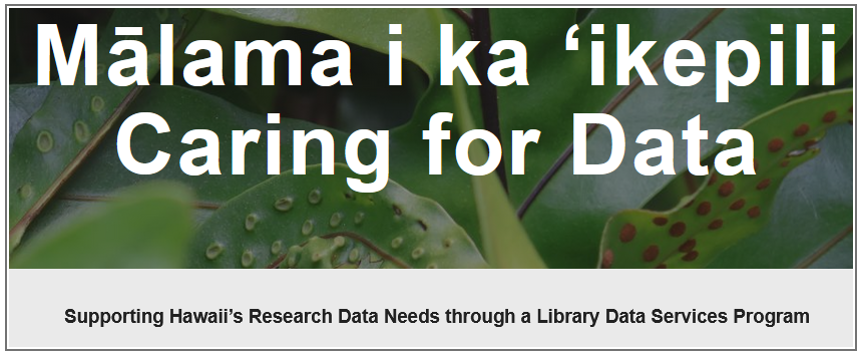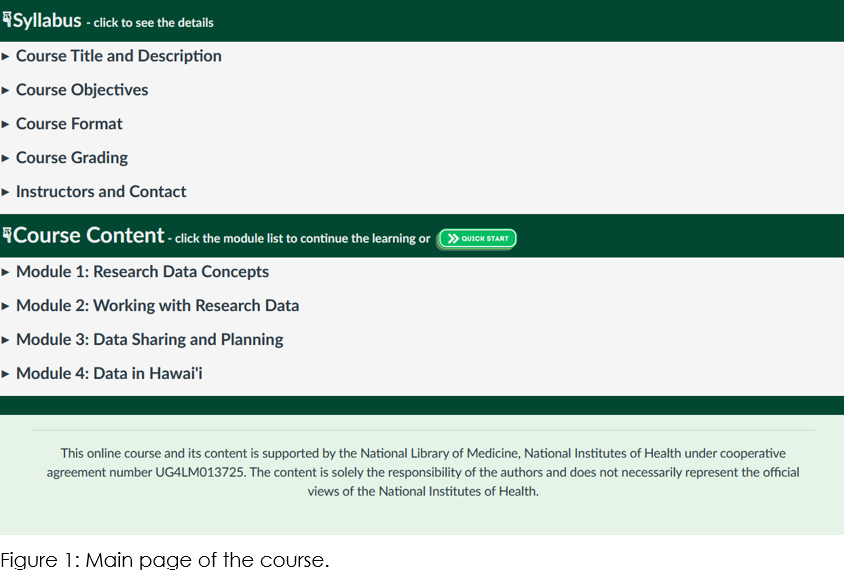Jul
13

Posted by Carolyn Martin on July 13th, 2023
Posted in: Data Science, Funding, News from Network Members, News from NNLM Region 5
Tags: data, data course, data ethics, data management and sharing, Funding
We thank Jonathan Young and Carolyn Dennison, librarians at the University of Hawaiʻi at Mānoa, for the following guest post.
“This seems basic, but I don’t see it really taught . . . if you have an idea, find the community that will be impacted by it and work with them and talk with them.”
Jane Chung-Do
Caring for Data Symposium Keynote Address
Aloha everyone! We are excited to share our recent work at the University of Hawaiʻi at Mānoa (UHM), made possible by the NNLM Region 5 Data Engagement Award.

Going into this project there was little support for any data management or sharing assistance in terms of resources and services at the University of Hawaiʻi at Mānoa (UHM) Library. As the largest academic library in the state, and an information services provider to the Hawaiʻi public, UHM Library wanted to develop these resources and services, but had no staff dedicated to support data management. As Hawaiʻi is located in the center of the Pacific, separated by almost 2,500 miles of ocean from the nearest major research institutions, this lack of data management support is a critical area of need for researchers here. We applied for the Network of the National Library of Medicine (NNLM) Data Engagement Grant to provide the resources needed to overcome the initial investment of establishing an instructional presence for the library in this area.
Given that we were aiming to use the Data Engagement Award to lay the foundation for improved data services at our library, but could not count on future funding or support, we developed a project to create an online course as a lasting instructional and reference tool on the subject that was customized to Hawaiʻi’s unique needs , and could be used to center the library in the campus discussion on data management needs. To that end, we conducted a needs assessment survey, hired an instructional designer from UH’s College of Education Learning Design and Technology program, and hosted an interdisciplinary symposium in the library focused on data management and sharing.
We created a detailed, asynchronous online course which would allow our learners – graduate students and faculty – to delve into the topic at their own pace and convenience. It also would serve as a reference and training tool for the library’s staff. The course was divided into four modules (see Figure 1). The first three closely followed existing data management and sharing content already available online, but with details and branding customized to UHM. The final module, Data in Hawaiʻi, focused on the unique needs, problems, resources, and opportunities for those working with research data in Hawaiʻi, such as indigenous data sovereignty, ethnic and linguistic data due to Hawaii’s unique demographics, and the challenges of remote data collection, storage and transmission from our islands in the middle of the Pacific.

In addition to the online course, we hosted a research data symposium titled Caring for Data in Hawaiʻi. This symposium was located in the library, with the aim of bringing faculty and graduate students from various disciplines with data management experiences and interests to the library, positioning it as a central location on this topic. It would be a forum to discuss the complexities of data management across fields. We succeeded in attracting that audience. Our presenters came from a diverse set of fields: education, engineering, public health, medicine, and oceanography. More importantly, the symposium brought us into contact with researchers at our institution already deeply interested in data questions. These researchers provided us with additional content for the course, and could be potential collaborators for future projects.
Our keynote presentation was an inspiring talk from the Waimānalo Pono Research Hui, a local community organization that collaborates with those interested in conducting community-based research. The hui’s representatives gave us invaluable insights into how they work towards ethical research practices by empowering the community and respecting local data sovereignty. Their presentation served as a crucial reminder that data is not just numbers and figures but deeply tied to the people and communities it represents.
For anyone planning to embark on a similar venture, here are a few words of advice:
Mālama is the term that resonated most with us as we reflected on our project’s journey. It means to care for, tend, attend to, and we used it in our project title to refer to data, but it grew to refer to caring for our local community as well. What had started as a project to deliver widely recognized best practices in data management to our “users” became a means to build a community. “Think globally, act locally” might be another lesson we learned. Our project, supported by the NNLM Data Engagement Award, has not only addressed a critical gap in our institution’s data management support but also fostered a community discussion about data ethics, management, and sharing. Thanks to our efforts and the funding of NNLM Region 5, the University of Hawaiʻi at Mānoa is now better equipped to handle the unique challenges and opportunities of data management in the Pacific.
For more insights and learnings from our project, visit the following sites,